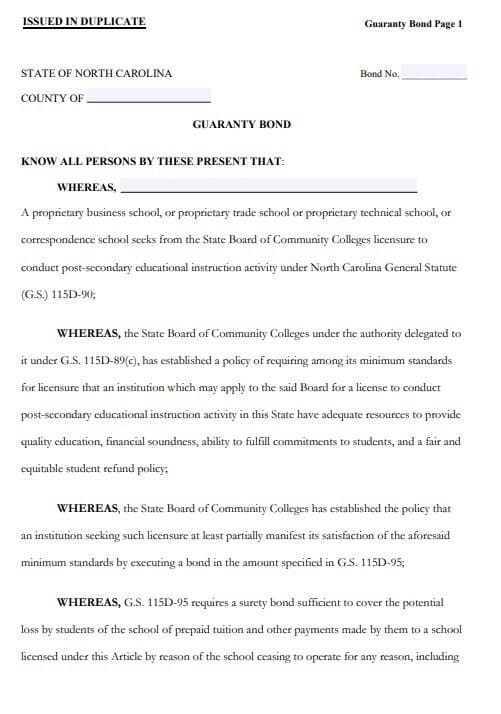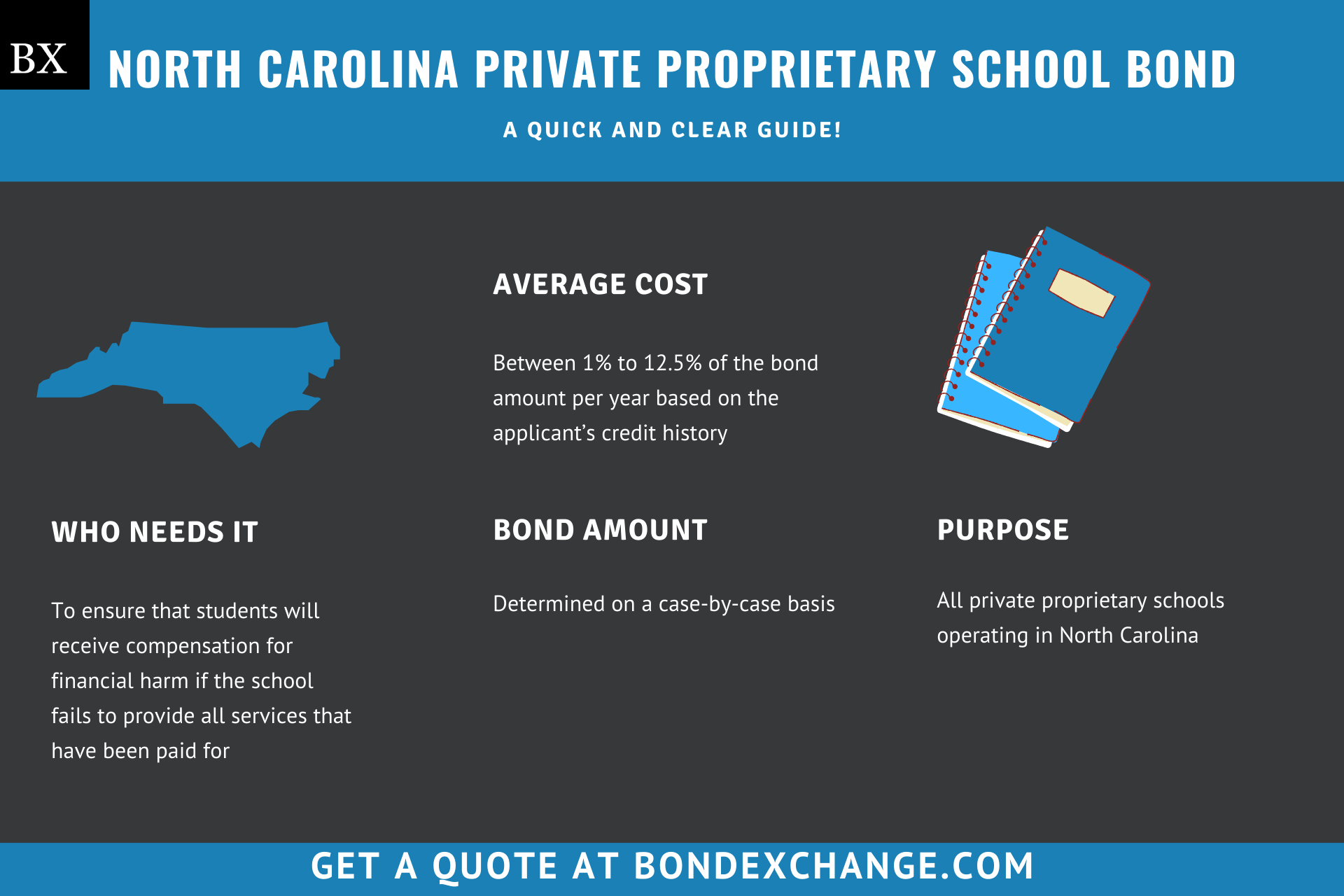North Carolina Private Proprietary School Bond: A Comprehensive Guide
This guide provides information for insurance agents to help their customers obtain a North Carolina Private Proprietary School bond
At a Glance:
- Average Cost: Between 1% to 12.5% of the bond amount per year based on the applicant’s credit history
- Bond Amount: Determined on a case-by-case basis (more on this later)
- Who Needs it: All private proprietary schools operating in North Carolina
- Purpose: To ensure that students will receive compensation for financial harm if the school fails to provide all services that have been paid for
- Who Regulates Private Proprietary Schools in North Carolina: The North Carolina Board of Community Colleges
Background
North Carolina Statute 115D-90 requires all private proprietary schools operating in the state to obtain a license from the Board of Community Colleges. The North Carolina legislature enacted the licensing requirement to ensure that private proprietary schools engage in ethical business practices and are qualified to provide instruction. To provide financial security for the enforcement of the licensing law, private proprietary schools must purchase and maintain a surety bond to be eligible for licensure.
What is the Purpose of the North Carolina Private Proprietary School Bond?
North Carolina requires private proprietary schools to purchase a surety bond as part of the application process to obtain a business license. The bond ensures that students will receive compensation for financial harm if the school fails to comply with the regulations outlined in North Carolina Statute 115D-95. Specifically, the bond protects students if the school ceases operations and fails to provide refunds for services that have been paid for but not received. In short, the bond is a type of insurance that protects students if the private proprietary school violates the terms of its license.

How Can an Insurance Agent Obtain a North Carolina Private Proprietary School Surety Bond?
BondExchange makes obtaining a North Carolina Private Proprietary School bond easy. Simply login to your account and use our keyword search to find the “Proprietary School” bond in our database. Don’t have a login? Gain access now and let us help you satisfy your customers’ needs. Our friendly underwriting staff is available by phone (800) 438-1162, email or chat from 7:30 AM to 7:00 PM EST to assist you.
At BondExchange, our 40 years of experience, leading technology, and access to markets ensures that we have the knowledge and resources to provide your clients with fast and friendly service whether obtaining quotes or issuing bonds.
Not an agent? Then let us pair you with one!

Click the above image to find a BX Agent near you
How is the Bond Amount Determined?
North Carolina Statute 115D-95 dictates that the bond amount must be calculated differently depending on how many years the school has been licensed, as outlined below:
- Initial Licensure: Determined on a case-by-case basis by the board and must be in an amount sufficient to offer protection to every student enrolled by the school. The bond must be at least $25,000.
- First Four Renewals: Must be equal to the greatest amount of unearned tuition held by the school at any point during the previous fiscal year.
- Bonds must be immediately increased if the school’s bond amount becomes inadequate by at least 5% (checked on a quarterly basis).
- *Schools Licensed for More Than Five Years:
- If the balance of the state’s Student Protection Fund is below the catastrophic loss amount, the bond must be in an amount equal to the highest amount of prepaid tuition held in the previous fiscal year multiplied by the number of percentage points the protection fund is deficient.
- If the amount of prepaid tuition the school held in the previous fiscal year exceeds the catastrophic loss amount, the bond amount must equal the highest amount of prepaid tuition held in the previous fiscal year plus the difference between the tuition held and the catastrophic loss amount.
*North Carolina has a Student Protection Fund that compensates students for prepaid tuition that has been lost as a result of schools not providing complete instruction and/or other agreed-upon services. Each North Carolina proprietary school pays into the fund on a yearly basis in an amount based on the total number of prepaid tuition they collected. The fund has a “catastrophic loss amount” equal to one-half of the yearly protection fund payments collected by the state’s proprietary schools. If the protection fund falls below the catastrophic loss amount, the state will institute additional fees and raise the bond amounts for certain proprietary schools.
Is a Credit Check Required for the North Carolina Private Proprietary School Bond?
Surety companies will run a credit check on the owners of the school to determine eligibility and pricing for the North Carolina Private Proprietary School bond. Owners with excellent credit and work experience can expect to receive the best rates. Owners with poor credit may be declined by some surety companies or pay higher rates. The credit check is a “soft hit,” meaning that the credit check will not affect the owner’s credit.
How Much Does the North Carolina Private Proprietary School Bond Cost?
The North Carolina Private Proprietary School bond can cost anywhere between 1% to 12.5% of the bond amount per year. Insurance companies determine the rate based on several factors including your customer’s credit score and experience. The chart below offers a quick reference for the cost of a $25,000 bond requirement.
$25,000 Private Proprietary School Bond Cost
| Credit Score | Bond Cost (1 year) | Bond Cost (1 month) |
|---|---|---|
| 720+ | $250 | $25 |
| 680 – 719 | $375 | $38 |
| 650 – 679 | $500 | $50 |
| 600 – 649 | $1,000 | $100 |
| 550 – 599 | $1,875 | $188 |
| 500 – 549 | $3,125 | $313 |
*The credit score ranges do not include other factors that may result in a change to the annual premium offered to your customers, including but not limited to, years of experience and underlying credit factors contained within the business owner’s credit report.
Who is Required to Purchase the Bond?
North Carolina requires proprietary schools to purchase a surety bond as a prerequisite to obtaining a business license. To paraphrase North Carolina Statute 115D-87, a proprietary school is an educational institution that is physically located in North Carolina and satisfies all of the following criteria:
- Is a privately owned business or nonprofit organization
- Offers instruction to persons that:
- Have completed their elementary and secondary education
- Is at least 16 years old
- Are able to benefit educationally and/or vocationally from the instruction
- Charges tuition
- Offers programs that serve one or more of the following purposes:
- Helps students prepare for professional licensing exams
- Prepares students for employment at a beginner or advanced level
- Provides a postsecondary educational credential below the associate degree level
BondExchange now offers monthly pay-as-you-go subscriptions for surety bonds. Your customers are able to purchase their bonds on a monthly basis and cancel them anytime. Learn more here.
How do North Carolina Private Proprietary Schools Apply for a License?
Private proprietary schools in North Carolina must navigate several steps to obtain a license. Below are the general guidelines, but applicants should refer to the preliminary application form for details on the process.
License Period – All North Carolina Proprietary School Licenses expire on June 30 of each year and must be renewed before the expiration date
Step 1 – Complete the Preliminary Application
Applicants must mail a preliminary license application to the following address:
Office of Proprietary Schools
NC Community College System
5001 Mail Service Center
Raleigh, NC 27699
The Board of Community Colleges will review the application and determine whether or not the school does in fact need to be licensed. Once the board determines that the applicant must be licensed, they will send them instructions on how to proceed with the rest of the licensing process.
Step 2 – Purchase a Surety Bond
Proprietary schools must purchase and maintain a surety bond. The board recommends all first-time applicants purchase a $25,000 bond. However, they may require applicants to increase their bond amounts after reviewing their applications.
Step 3 – Complete the Application
Schools that have their preliminary application accepted must submit an application for initial licensure to the following address:
200 West Jones Street
Raleigh, NC 27603
Schools must complete the application in its entirety and submit the following items:
-
- Fees:
- $3,200 license fee plus an additional $50 per program
- $1,250 student protection fund fee
- Application to measure programs in credit hours (only required for accredited schools)
- Proposed catalog, including:
- Checklist for school catalog
- Catalog certification
- Proposal to add a new program
- Agency approvals and externship/practicum agreements (if applicable)
- Administration and faculty approval reports
- Proposed student application and enrollment agreement
- Proposed administrative forms
- Copy of school’s lease/deed and floor plan
- City/county fire safety report
- Copy of the school’s corporate charter
- Proposed operating budget and financial business plan
- Documentation of the school’s financial resources
- Teach-out plan and notice of closure requirement
- Fees:
All applications must be submitted in a three-ring binder with numbered divider tabs separating each section.
How do North Carolina Proprietary Schools Renew Their Licenses?
Proprietary schools can access the renewal application online here and must mail their completed applications, including a $1,700 renewal fee (plus $50 per licensed program), to the following address:
200 West Jones Street
Raleigh, NC 27603
All North Carolina Proprietary School Licenses expire on June 30 of each year and must be renewed before the expiration date.
What are the Insurance Requirements for Private Proprietary Schools in North Carolina?
North Carolina does not require private proprietary schools to purchase any form of liability insurance as a prerequisite to obtaining a business license. Private proprietary schools must purchase and maintain a surety bond (limits outlined above).
How Do North Carolina Private Proprietary Schools File Their Bonds?
Private proprietary schools should submit their completed bond forms, including the power of attorney, to the following address:
200 West Jones Street
Raleigh, NC 27603
The surety bond requires signatures from both the surety company that issues the bond and the applicant. The surety company should include the following information on the bond form:
- Legal name of the entity/individual(s) buying the bond
- Surety company’s name and state of incorporation
- Bond amount
- Date the bond goes into effect
- Date the bond is signed
What Can North Carolina Private Proprietary Schools do to Avoid Claims Made Against Their Bonds?
To avoid claims against their bonds, private proprietary schools in North Carolina must follow all license regulations in the state, including some of the most important issues below that tend to cause claims:
- Do not breach any contracts made with consumers
- Issue refunds for all services that have been paid for but not received
What Other Insurance Products Can Agents Offer North Carolina Private Proprietary Schools?
Most reputable private proprietary schools will purchase liability insurance. Bonds are our only business at BondExchange, so we do not issue any other types of insurance, but our agents often utilize brokers for this specific line of business. A list of brokers in this space can be found here.
How Can Insurance Agents Prospect for North Carolina Private Proprietary School Customers?
North Carolina conveniently provides a public database of active proprietary schools in the state. Contact BondExchange for additional marketing resources. Agents can also leverage our print-mail relationships for discounted mailing services.

